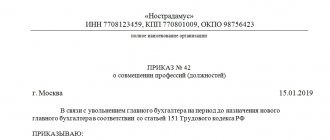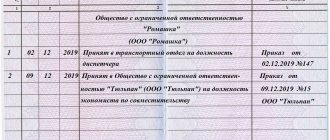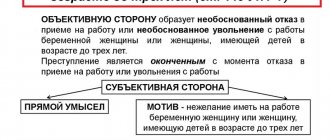One-time gross violation of labor duties by an employee
A gross violation of labor duties is the behavior of an employee that is not acceptable for the continuation of his work activity at his current job, based on which the employer is authorized to fire him.
The list of situations defining such acts is considered at the legislative level mainly in Article 81 and is regulated by the Labor Code of the Russian Federation by listing them in paragraph 6 under subparagraphs: “a”, “b”, “c”, “d”.
Single gross labor violations include:
- Absenteeism is considered if a person is absent from the place or area of work for more than 4 hours or for the duration of the shift without prior approval of his absence from the boss and without a valid reason;
- Intoxication due to the consumption of alcoholic beverages, toxic or narcotic substances immediately before or during work;
- Disclosure of official, commercial, state or other secrets, neglect of the ban on its disclosure, information about which was provided to the employee upon joining the organization or in the course of professional activities;
- Embezzlement or intentional damage to property, theft of state or other people's items, theft - is punishable by both removal from professional duties and criminal prosecution. Information about these actions is recorded in subparagraph “d” of paragraph 6 of Article 81 of the Labor Code of the Russian Federation.
InformationIn addition, the injured party may request compensation for moral damage on the basis of Article No. 151 of the Civil Code of the Russian Federation if the victim is proven to have infringed upon personal non-property rights as a result of such an action, proclaimed in the Constitution of the Russian Federation.
- Violations of rules and labor protection measures that have become a source of serious consequences (accident, breakdown, breakdown of systems, etc.), as well as the creation of a situation that obviously provokes such consequences. In this case, the worker must be previously familiarized with safety precautions against signature, and the organization must create all conditions for the safe performance of work.
The employer or department head is obliged to record the violation, confirming it with facts, and take measures to influence the worker, guided by Article No. 192-193 of the Labor Code of the Russian Federation.
Grounds for termination of an employment contract by an employer
The procedure for terminating an employment contract at the initiative of the employer is regulated by Article 81 of the Labor Code of the Russian Federation.
According to the provisions of the above article, an employment contract can be terminated by the employer in the following cases:
- Liquidation of an organization or termination of activities by an individual entrepreneur.
- Reduction in the number or staff of an organization or individual entrepreneur.
- Inconsistency of the employee with the position held or the work performed due to insufficient qualifications confirmed by certification results.
- Change of ownership of the organization's property (in relation to the head of the organization, his deputies and the chief accountant).
- Repeated failure by an employee to perform job duties without good reason, if he has a disciplinary sanction.
- A single gross violation of labor duties by an employee:
- Absenteeism, that is, absence from the workplace without good reason throughout the entire working day (shift), regardless of its duration, as well as in the case of absence from the workplace without good reason for more than four hours in a row during the working day (shift) ;
- The appearance of an employee at work (at his workplace or on the territory of an organization - employer or facility where, on behalf of the employer, the employee must perform a labor function) in a state of alcohol, narcotic or other toxic intoxication;
- Disclosure of secrets protected by law (state, commercial, official and other) that became known to an employee in connection with the performance of his job duties, including disclosure of personal data of another employee.
- Committing at the place of work theft (including small) of someone else's property, embezzlement, intentional destruction or damage, established by a court verdict that has entered into legal force or a resolution of a judge, body, official authorized to consider cases of administrative offenses.
- A violation by an employee of labor protection requirements established by the labor protection commission or the labor protection commissioner, if this violation entailed serious consequences (work accident, breakdown, catastrophe) or knowingly created a real threat of such consequences.
- Committing guilty actions by an employee directly servicing monetary or commodity assets, if these actions give rise to a loss of trust in him by the employer.
- Failure by the employee to take measures to prevent or resolve a conflict of interest to which he is a party, failure to provide or submit incomplete or unreliable information about his income, expenses, property and property obligations, or failure to provide or provision of knowingly incomplete or unreliable information about income, expenses, property and property obligations of their spouse and minor children, opening (having) accounts (deposits), storing cash and valuables in foreign banks located outside the territory of the Russian Federation, possession and (or) use of foreign financial instruments by an employee, his spouse (wife) and minor children in cases provided for by the Labor Code of the Russian Federation, other federal laws, regulatory legal acts of the President and the Government of the Russian Federation, if these actions give rise to a loss of confidence in the employee on the part of the employer.
- Commitment by an employee performing educational functions of an immoral offense incompatible with the continuation of this work.
- Making an unjustified decision by the head of the organization (branch, representative office), his deputies and the chief accountant, which entailed a violation of the safety of property, its unlawful use or other damage to the property of the organization.
- A single gross violation by the head of the organization (branch, representative office) or his deputies of their labor duties.
- Submission of false documents by an employee to the employer when concluding an employment contract.
- Provided for by the employment contract with the head of the organization, members of the collegial executive body of the organization.
- In other cases* established by the Labor Code of the Russian Federation and other federal laws.
*For example, in accordance with the provisions of Article 312 and Article 312.5 of the Labor Code of the Russian Federation, termination of an employment contract with employees (homeworkers and remote workers) at the initiative of the employer is carried out on the grounds provided for in the employment contract.
Dismissal procedure
To begin the dismissal process, the main source document is the Act, drawn up in free form and certified with marks in the form of signatures of two witnesses to the event in question. Proper completion of the Act requires entering the date of its formation, time and information about specific immoral acts of the citizen or incident, as well as the signature of the worker in respect of whom it was drawn up.
Information
The procedure for disciplinary sanctions is provided for in Articles 192-193 of the Labor Code of the Russian Federation.
The stages of dismissal include:
- the fact of neglect of the rules for the progress of work is recorded by means of an Act;
- if there are several violations or days during which they were committed, the Report is drawn up separately for each;
- the reasons for the disruption of work should be determined by writing an explanatory note for up to 3 days by the employee who violated the established rules;
- the worker’s explanatory note is attached to the main documents;
- if a citizen refuses to fill out an explanatory note, a corresponding Report of this event is drawn up;
- the prepared report is sent to the general director of the organization;
- the dismissal order is formed taking into account the T-8 form, with the introduction of justification for the type of non-compliance with the labor process and in accordance with the established regulations no later than 30 days from the date of the incident.
If it is not possible to establish personal contact with the employee, the request is sent by registered mail to the place of his registration. Upon receipt of the letter, the citizen is obliged to come to the organization to create an explanatory note, and in case of serious illness, provide a written response.
Information
If a letter is returned to the organization with a mark of unclaimed, you should determine the location of the person by interviewing neighbors or by contacting the authorized local police department.
Formation of an order
| Order | Description |
| Definition of an order | The order is a document that continues the process of removal from professional activity on the basis of unacceptable behavior of the worker. |
| Contents of the order |
|
Attention
The employee must familiarize himself with the provisions of the document, personally sign it and receive a copy. The order is registered by registration in the personnel register of the organization.
The job descriptions of the head or HR department, accounting department, include the issuance of such documentation as:
- work and medical records, if available;
- certificate of average salary according to the report for the last 3 months in form 2-NDFL;
- form 182N about wages for the final 2 years;
- extracts of records of insurance savings in the form SZV-STAZH, SZV-M;
- additional papers if they are requested by the person being dismissed.
In addition to issuing documentation, a settlement must be made with the employee on the day of dismissal.
Attention
If the completion of the stages of the dismissal process falls on a weekend, then all calculations and payments are made on the next working day.
Disciplinary sanctions and the procedure for their application
So, according to clause 5 of Article 81 of the Labor Code of the Russian Federation, an employer can dismiss an employee for repeated failure by the employee (without good reason) to fulfill his job duties if he has a disciplinary sanction.
Let's take a closer look at this point. What is meant by disciplinary action?
In accordance with the provisions of Article 191 of the Labor Code of the Russian Federation, disciplinary sanctions can be applied to an employee who has committed a disciplinary offense. A disciplinary offense includes:
- Failure to perform (unfair/low-quality performance) by an employee of his assigned job duties.
For committing a disciplinary offense, the employer has the right to apply the following disciplinary sanctions:
- comment;
- rebuke;
- dismissal for appropriate reasons.
Federal laws, charters and regulations on discipline (Part 5 of Article 189 of the Labor Code of the Russian Federation) may also provide for other disciplinary sanctions for certain categories of employees.
It is important to remember that such failure to fulfill duties is a disciplinary offense only if it occurred through the fault of the employee himself.
You cannot first prevent an employee from performing his job duties and then apply disciplinary sanctions against him.
Disciplinary sanctions, in particular, include the dismissal of an employee on the grounds provided for in clauses 5, 6, 9 or 10 of part one of Article 81 of the Labor Code of the Russian Federation, clause 1 of Article 336 or Article 348.11 of the Labor Code of the Russian Federation, as well as clauses 7, 7.1 or 8 of part one of Article 81 of the Labor Code of the Russian Federation in cases where guilty actions giving grounds for loss of confidence, or, accordingly, an immoral offense were committed by an employee at the place of work and in connection with the performance of his job duties.
Please note: The use of disciplinary sanctions not provided for by federal laws, charters and discipline regulations is not permitted .
When imposing a disciplinary sanction, the severity of the offense committed and the circumstances under which it was committed must be taken into account.
In accordance with the provisions of Article 192 of the Labor Code of the Russian Federation, before applying a disciplinary sanction to an employee, the employer must request a written explanation from him. If after two working days the employee does not provide the specified explanation, then a corresponding act is drawn up.
Please note: The absence of an explanation from the employee is not an obstacle to applying disciplinary action.
Disciplinary action is applied no later than one month from the date of discovery of the misconduct. The following are excluded from this period:
- employee's sick time,
- his stay on vacation,
- the time required to take into account the opinions of the representative body of workers.
A disciplinary sanction cannot be applied later than six months from the date of commission of the offense, and based on the results of an audit, inspection of financial and economic activities or an audit - later than two years from the date of its commission.
The specified time limits do not include the time of criminal proceedings. only one can be applied .
The employer's order (instruction) to apply a disciplinary sanction is announced to the employee against signature within three working days from the date of its publication, not counting the time the employee is absent from work. If the employee refuses to familiarize himself with the specified order (instruction) against signature, then a corresponding act is drawn up.
A disciplinary sanction can be appealed by an employee:
- to the state labor inspectorate,
- bodies for consideration of individual labor disputes.
According to Article 195 of the Labor Code of the Russian Federation, if within a year from the date of application of a disciplinary sanction an employee is not subject to a new disciplinary sanction, then he is considered not to have such a sanction.
The employer, before the expiration of a year from the date of application of the disciplinary sanction, has the right to remove it from the employee:
- on their own initiative,
- at the request of the employee himself,
- at the request of his immediate supervisor or a representative body of employees.
Recording in labor
One of the stages of the dismissal process involves recording in the work book with taking into account the Resolution “On the approval of documents on labor accounting and payments.”
Filling out a work book consists of:
- indication of information in the first column intended to create an event number in order;
- the second column should contain information about the date of the event;
- in the third column you should indicate the specific provisions of the article of the Labor Code, its part or subparagraph, taking into account which the removal from professional activities is carried out;
- The fourth line is intended for entering the order number and the time of its creation.
A note on the records with their complete duplication in the form of a copy is transferred according to the T-2 form to a personal card and certified by the signature of the dismissed person. After which the information is transferred to the archive, and the work book is provided to the dismissed employee on the day of termination of the contractual relationship.
Information
If a citizen fails to appear and if it is not possible to find him, a written notice is sent to his place of residence or official registration address containing a request to appear for the document or a request for permission to send it by post with a list of the attachments.
If the citizen does not respond, a report is drawn up stating that it is impossible to transfer the work book to him and it is sent to the archive for storage. However, it is issued to the dismissed person within 3 working days upon his first request, including the day of registration of the corresponding application on his initiative.
Lack of working conditions in the workplace
One of the mandatory provisions of an employment contract is the clause on working conditions in the workplace. From January 1, 2014, this requires a special assessment of working conditions. It is allowed not to carry it out only if workplace certification was carried out before the beginning of 2014, but no more than five years ago.
If the contract was concluded after January 1, 2014, it must contain working conditions. If there are no such provisions, then the employer may be fined under Part 4 of Article 5.27 of the Administrative Code.
At the same time, it is unacceptable to prescribe working conditions in a contract without conducting a special assessment . What to do if it was not carried out? The Ministry of Labor advises to indicate general characteristics of working conditions. However, this will not exempt the employer from punishment for violating labor laws when the inspection comes. If the certification of workplaces is overdue, and a special assessment has not yet been carried out, then it must be carried out as soon as possible .
It should be
The working conditions must be specified in the contract in accordance with the classification of Law No. 426-FZ . It implies 4 classes of conditions:
- class 1 - optimal;
- class 2 - acceptable;
- class 3 - harmful;
- class 4 - dangerous.
Example: “Working conditions at the workplace are acceptable working conditions (2nd class), which is confirmed by the report on a special assessment of working conditions, approved on 02/15/2016.”
If the employer later has new vacancies, in accordance with Article 17 of Law No. 426, an unscheduled special assessment of working conditions . It must be carried out within 12 months from the date of organization of workplaces.
Compensation and payments
After entering information into the work book, the dismissed person is paid in cash equivalent.
Financial obligations to the employee in the form of payments are also made on the day of cancellation of the employment contract (Article 140 of the Labor Code of the Russian Federation).
Severance payments include:
- payment for days worked;
- unused vacation period provided for by the schedule (Article 127 of the Labor Code of the Russian Federation);
- severance pay, if it is due under an employment or collective agreement.
How can a disciplinary sanction be reversed?
If the relevant authorities - a court, a labor inspectorate and other similar structures - have made a decision that it is incorrect to apply a penalty to an employee on disciplinary grounds, then the manager must:
- issue an order to cancel a previously issued decision on disciplinary action;
- familiarize the wrongfully punished employee with this document against signature;
- if necessary, enter the relevant information into his work book.
It should also be noted that the order must contain the following information:
- grounds for reversing the decision;
- details of this decision;
- necessary information about the punished employee;
- the type of penalty applied to him.
This order indicates that the employer took into account the decisions of the relevant authorities and took measures to correct the situation.
Can dismissal be challenged?
Inaccuracies and errors must not be allowed when filling out forms generated when a worker is removed from work duties.
Attention
You cannot fire a woman in a position. A pregnant employee can be fined for violations under Article 81, paragraph 6, and other disciplinary sanctions applied, but she cannot be dismissed on this basis.
Documented justification for the employer's actions will be required during legal proceedings if a dismissed employee wishes to be reinstated to continue his professional activities in a particular organization through the court, based on violations in the dismissal procedure.
Normative base
A detailed list of reasons for terminating an employment contract with an unsuitable specialist for some reason is given in Art. 81 TK. The norm stipulates that grounds for dismissal may be:
- Subclause 5 – repeated disciplinary action for refusal to perform labor functions specified in the contract;
- Subparagraph 6 – one-time, but flagrant violation of labor discipline (absenteeism, drunkenness, disclosure of secret information, theft, ignoring labor safety standards);
- Subclause 9 – irresponsible management decision that caused financial and material losses.










